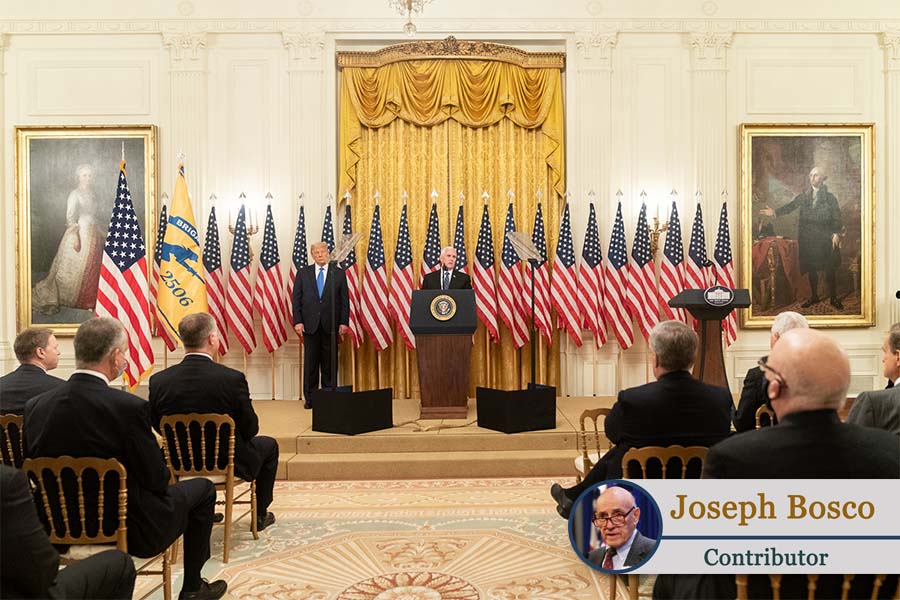◎ The existential threat to the United States from the People’s Republic of China will be the most serious foreign policy challenge confronting Donald Trump, Joe Biden, Mike Pence, and Kamala Harris.
The existential threat to the United States from the People’s Republic of China will be the most serious foreign policy challenge confronting a reelected Donald Trump, a newly-elected Joe Biden, a constitutionally-appointed and/or newly elected Mike Pence, or a constitutionally-appointed Kamala Harris.
Whichever of these individuals, or pairs of individuals, ends up exercising the powers of the presidency, he and/or she would be well advised to commit his/her administration to the core China policies of the Trump administration and to retain in their positions as many of President Trump’s Asia hands as is politically tolerable.
Notwithstanding the president’s stylistic proclivities and negotiating gambits, he has appointed the most innovative, courageous team of public officials ever to address Communist China’s across-the-board aggression — and has empowered them to formulate and implement the economic, diplomatic and military policies essential to countering that aggression.
The first area to be tackled was trade, because the economic power it generated enabled all of China’s other assertiveness. It is where the president was most directly involved by virtue of his business experience. Trump complained for years before entering politics that China was taking advantage of the rules-based international system by cheating and reneging on agreements, stealing the West’s intellectual property and business secrets, and manipulating its trade and currency practices. He saw American and European corporations and governments indulging Beijing out of a combination of greed, fear and naïveté.
Trump and his trade team took on China’s economic aggression frontally and unflinchingly, and achieved a Phase 1 breakthrough that, if carried out, would have started the communist government on the path to long-promised and long-delayed internal economic and political reform. The building momentum that saw China’s economic rise and America’s relative decline was now being halted and about to commence a reverse dynamic.
But, seemingly out of nowhere — or rather, from a place called Wuhan, China — a deadly virus mysteriously emerged and, as a result of a series of deceptive actions by Beijing, spread rapidly throughout the world, crippling economies and paralyzing societies. The Trump administration’s hard-won trade breakthrough quickly dissipated, ending in presidential disillusionment with the reliability of Chinese leader Xi Jinping in the international arena. Economic and political reform in the People’s Republic was again indefinitely deferred.
But the Trump team, still with the president’s personal involvement, was not deterred from continuing the counter-offensive on several other fronts. In the critical area of combined economic and national security, it targeted the threats posed by Chinese business powerhouses ZTE, Huawei and Tik Tok. As with the trade deal and its impact on American farmers, important American economic interests suffered collateral damage when the screws were tightened on those Chinese companies, but the administration persevered in the face of diplomatic criticism and domestic corporate pressures.
When it came to the volatile environment of Chinese territorial assertiveness and nascent military aggression, an area where Trump had no experience, he heeded the advice of national security officials and authorized a forward-leaning program of Freedom of Navigation Operations in the South China Sea and enhanced U.S. Navy transits through the Taiwan Strait. Further on Taiwan, Trump went with the sound guidance and experience of his foreign policy complement, reinforced by a series of pro-Taiwan congressional initiatives, some controversial, but all of which the president willingly signed into law.
He also approved legislation punishing Chinese officials for their treatment of Tibetans, Uighurs and Hong Kongers. Secretary of State Mike Pompeo and a slate of administration officials delivered speeches and took actions targeting Beijing’s massive human rights transgressions and other violations of international law and norms.
Pompeo carried the argument to its logical extreme. Calling on the international community and the Chinese people, working together or in parallel, to press the Chinese Communist Party (CCP) to end its aggressive and illegal behavior, he effectively advocated regime change in China.
That should be the goal of all four of the individuals who prospectively will be exercising the powers of the presidency for all or most of the next four years. It would be useful if the candidates would join in publicly putting Beijing on notice that Americans are united in opposing the CCP’s domestic and international conduct.
The candidates should back up that message to the Chinese people by committing their potential administrations to a revived strategic communications campaign to deliver the truth to the Chinese people, similar to what the West successfully accomplished with the Soviet Union and communist regimes in Eastern Europe.
If like-minded countries in Europe, Asia, Africa and Australia join such a U.S.-led effort as Pompeo urged, or develop their own collaborative efforts toward the same end, the global community can experience the same peaceful transformation that ended the Cold War. History shows the catastrophic alternative when totalitarianism goes unchecked.
Joseph Bosco served as China country director for the Secretary of Defense from 2005 to 2006 and as Asia-Pacific director of humanitarian assistance and disaster relief from 2009 to 2010. He is a nonresident fellow at the Institute for Corean-American Studies and the Institute for Taiwan-American Studies, and has held nonresident appointments in the Asia-Pacific program at the Atlantic Council and the Southeast Asia program at the Center for Strategic and International Studies.
Views expressed by contributors are their own and do not necessarily reflect the views of SinoInsider.












